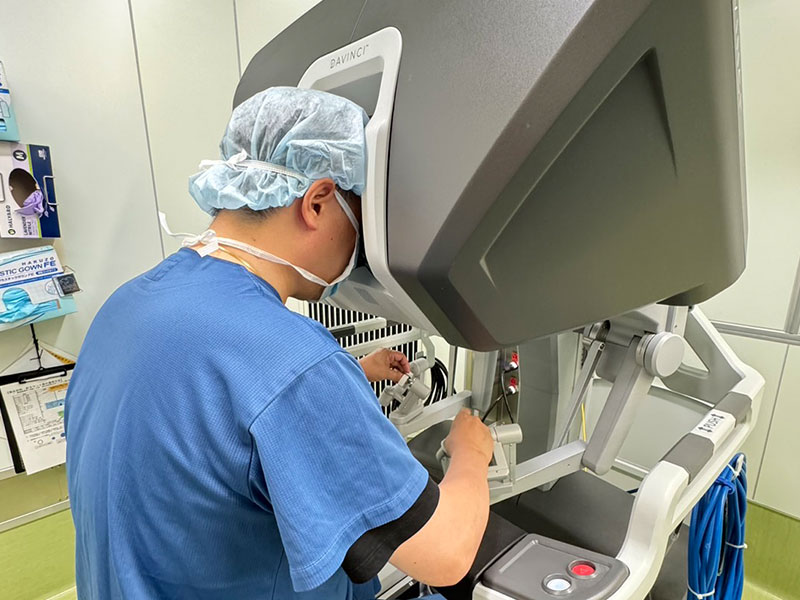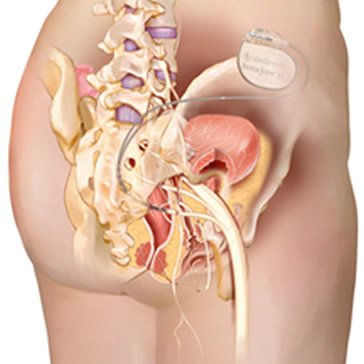Colorectal Surgery Expertise
Lower gastrointestinal surgery at Kishiwada Tokushukai Hospital is led by
Katsuji Tokuhara, M.D., Ph.D., a colorectal surgeon specializing in
minimally invasive surgery for colon and rectal cancer.
He has performed approximately 1,400 colorectal cancer operations and has
extensive experience in advanced low rectal cancer and complex pelvic surgery,
including ultra-low anterior resection and lateral pelvic lymph node dissection.
A selected list of publications is available here:
Publications – Lower Gastrointestinal Surgery
Treatments
- Robot-assisted surgery
- Laparoscopic surgery
- Multimodal treatment planning (surgery ± systemic therapy)
- Systemic chemotherapy for unresectable colorectal cancer
Treatment strategies are determined individually, with careful consideration
of curability and long-term quality of life.
We also provide care for selected benign conditions:
- Inflammatory bowel disease
- Rectal prolapse
- Fecal incontinence
- Emergency lower gastrointestinal conditions
Why choose treatment in Japan?
Japan is known for standardized, evidence-based surgical care and strict safety protocols.
In colorectal surgery, precise technique and meticulous perioperative management
are essential for both oncological outcomes and quality of life.
- Evidence-based colorectal cancer treatment planning
- Minimally invasive approaches when clinically appropriate
- Careful perioperative and postoperative management
- Structured follow-up and outcome monitoring
- Interpretation support for international patients
Our Services
Robotic surgery
Targeted Diseases: Colon Cancer, Rectal Cancer

Da Vinci Surgical System
Laparoscopic surgery, known for being a “body-friendly surgery” (minimally invasive surgery) that can be performed with small incisions, has become the standard treatment in Japan. In recent years, surgical assist robots have been introduced and are becoming increasingly widespread. Laparoscopic surgery was first introduced in the surgical field in the 1990s, and its usefulness has been confirmed. To further enhance laparoscopic surgery, surgical assist robots were developed.
Robot-assisted surgery is particularly useful for complex pelvic procedures,
including ultra-low anterior resection, intersphincteric resection,
and lateral pelvic lymph node dissection for advanced low rectal cancer.
4th Generation Da Vinci Xi
In 2021, our hospital installed the 4th generation Da Vinci Xi surgical assist robot. Since then, under the guidance of surgeons certified by the Japan Society for Endoscopic Surgery, we have actively implemented robot-assisted surgeries for rectal and colon cancers.
We will continue to actively introduce robot-assisted surgeries with the goal of promoting minimally invasive surgery and further improving our techniques through close collaboration among doctors, nurses, and clinical engineers. We will advance staff training and clinical research.
Laparoscopic Surgery
Targeted Diseases: Colon cancer, rectal cancer, rectal prolapse, acute appendicitis, lower gastrointestinal perforation, generalized peritonitis, and more.
Laparoscopic Surgery Overview
Laparoscopic surgery offers several advantages, including smaller incisions, minimal invasiveness, and the ability to perform precise operations thanks to its enhanced magnification.
In our department, under the guidance of surgeons certified by the Japan Society for Endoscopic Surgery, we perform laparoscopic surgery not only for colorectal cancer but also for benign conditions such as rectal prolapse, acute appendicitis, and generalized peritonitis caused by perforated diverticulitis.
Systemic Chemotherapy for Unresectable Colorectal Cancer
Targeted Diseases: Colon cancer, rectal cancer
For colorectal cancer diagnosed as unresectable, we implement systemic chemotherapy based on the Colorectal Cancer Treatment Guidelines, with the goal of improving patient survival outcomes. In some cases, even if the cancer is initially deemed unresectable, chemotherapy can be effective in shrinking the tumor, potentially making curative surgery possible.
When introducing systemic chemotherapy, we work closely with our palliative care team to ensure that care is provided with consideration for the patient’s quality of life (QOL).
Treatment for Functional Colorectal Disorders and Pelvic Organ Prolapse (Pelvic Functional Surgery)
Targeted Diseases: Fecal incontinence, chronic constipation, rectal prolapse, and others

Sacral Nerve Stimulation Therapy
In recent years, functional disorders related to bowel and bladder control have become significant concerns. It is estimated that around 5 million people in Japan suffer from fecal incontinence.
While these conditions are more common among the elderly, they can also affect patients who have undergone rectal or prostate surgery, often leading to a substantial decline in their quality of life (QOL).
Our department provides comprehensive diagnosis and specialized treatment for conditions such as fecal incontinence, constipation, and pelvic organ prolapse (including rectal prolapse) that result from dysfunctions of the rectum, bladder, uterus, and the muscle groups at the pelvic floor (such as the levator ani and anal sphincter muscles).
When conservative treatments, like medication, fail to improve fecal incontinence or rectal prolapse, surgical intervention may be recommended.
One of the surgical treatments available for fecal incontinence is Sacral Nerve Stimulation (SNS). This therapy is recommended as an effective treatment in the “Guidelines for the Treatment of Fecal Incontinence,” published in 2017. The procedure involves temporary stimulation for about two weeks, and if effective, a permanent stimulator is implanted under the skin of the lower back. Approximately 70% of patients experience improvement in fecal incontinence with this therapy.
For rectal prolapse, surgical options include transanal and transabdominal procedures, with the surgical approach chosen based on the severity of the prolapse. In cases where a less invasive treatment is desired, we perform laparoscopic rectopexy, a surgery that lifts and secures the rectum inside the abdomen.
For international patients and second opinions
If you have been diagnosed with colon or rectal cancer and are considering surgical options
or a second opinion, you may Contact us for an initial screening.
We will request detailed medical records only when a full medical review is appropriate.
Contact us for international inquiries and second opinions
Find Doctors
Katsuji Tokuhara, M.D., Ph.D.
徳原 克治
- Current Positions
-
Head, Lower Gastrointestinal Surgery
Director, Regional Medical Support Center
Kishiwada Tokushukai Hospital
- Clinical Focus
-
Colorectal cancer surgery (colon and rectal cancer)
Advanced low rectal cancer and complex pelvic surgery
Minimally invasive surgery (robot-assisted and laparoscopic)
- Experience & Expertise
-
Performed approximately 1,400 colorectal cancer surgeries
Extensive experience in ultra-low anterior resection,
intersphincteric resection, and lateral pelvic lymph node dissection
Certified proctor for robot-assisted colorectal surgery
- Board Certification & Credentials
-
Board-certified surgeon and instructor in gastrointestinal and colorectal surgery (Japan)
Certified robotic surgery console surgeon (da Vinci system)
Certified specialist in gastrointestinal cancer treatment
- Academic & Professional Activities
-
Former Professor / Associate Professor of Surgery at Kansai Medical University
Former Director of Pelvic Functional Center and Robotic Surgery Center
Active member of multiple national surgical and colorectal societies in Japan



